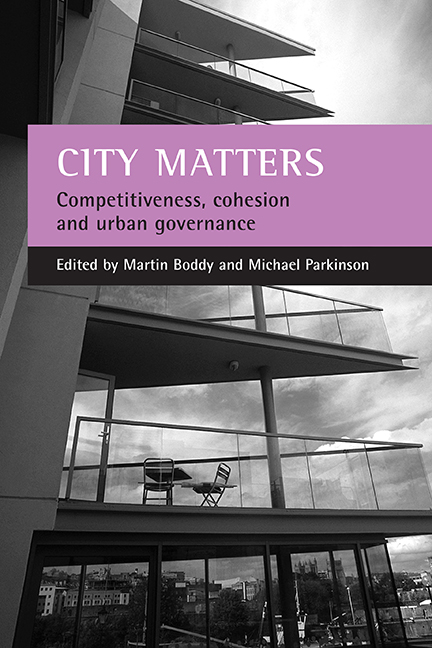Book contents
- Frontmatter
- Contents
- List of tables and figures
- Foreword
- Acknowledgements
- Notes on contributors
- one Introduction
- Part One Competitiveness, cohesion and urban governance
- Part Two Competitiveness and urban change
- Part Three Competitiveness, innovation and the knowledge economy
- Part Four Housing, property and economic performance
- Part Five Space, place and social cohesion
- Part Six Ethnicity, enterprise and social cohesion
- Part Seven Leadership, governance and social capital
- Conclusions
- Index
six - Urban growth and competitiveness in Britain: a long-run perspective
Published online by Cambridge University Press: 20 January 2022
- Frontmatter
- Contents
- List of tables and figures
- Foreword
- Acknowledgements
- Notes on contributors
- one Introduction
- Part One Competitiveness, cohesion and urban governance
- Part Two Competitiveness and urban change
- Part Three Competitiveness, innovation and the knowledge economy
- Part Four Housing, property and economic performance
- Part Five Space, place and social cohesion
- Part Six Ethnicity, enterprise and social cohesion
- Part Seven Leadership, governance and social capital
- Conclusions
- Index
Summary
Introduction
What factors underpin the competitive success or otherwise of different urban areas? This question, clearly, is central to any debate over the fortunes of different towns and cities in the British urban system. Taking a long-term view, over the past 50 years, say, some cities have consistently prospered, maintaining or increasing their share of national employment and population; others have lost ground and have struggled to attract new investment and jobs. Generally speaking, it is the major conurbations and large cities that grew rapidly in the 19th century that have typically lost both population and employment. The smaller towns and new towns1 (particularly those in the south of England and close to London) have, on the other hand, gained both population and employment.
Many of these shifts in population and employment have persisted over decades, in fact, rather than years. In the 1970s and 1980s, these trends received much attention as inner-city areas in the declining conurbations experienced worsening economic and social problems and intense difficulties in adapting to a rapidly changing economic environment (Hall, 1981; Gudgin et al, 1982; Begg et al, 1986; Robson, 1988; Breheny, 1999). And despite the proliferation of highly targeted area-based regeneration policies, many of these problems remain. Arguably, in some cities they have actually intensified and spread to other parts of the city, including outer estates and suburbs.
In parallel with these processes of geographical restructuring, there have been major shifts in the economic base of different towns and cities. This includes the well-documented decline in manufacturing employment and the rise of new sectors including finance and business services, high technology and the new ‘knowledge economy’. These, in turn, have impacted differentially on different towns and cities as new patterns of locational preference have impacted on investment and disinvestment.
This study set out to establish fundamental information about the factors that help shape the competitiveness of cities and which determine patterns of growth and decline. The aim was to identify the particular attributes of different urban areas – what can be termed the ‘asset base’ of the city – that create competitive advantage.
- Type
- Chapter
- Information
- City MattersCompetitiveness, Cohesion and Urban Governance, pp. 93 - 110Publisher: Bristol University PressPrint publication year: 2004



